Text
Friend, this is mjolnir levels of hitting the nail on the head and is going to become my defacto way of addressing this issue in the future.
That said, as someone who's experienced both "d&d is a boardgame with more steps" and "d&d is improv theatre with dice" while chasing my ideal game, I think I'm in a good position to point out what both groups lack.
The first group has a bad habit of confusing mechanical rigour with good gameplay, overfocusing on minutia to the exclusion of actual fun. I've been at one too many tables where the session time was eaten up by pointless busywork of forced perception AND investigation checks on every object in every room of a 200 chamber megadungeon (most of which was given up to spoiled stores and broken furniture), or simulating an eight day journey between settlements by rolling for weather changes every hour and having to consult a formula. It's a mistaken belief (largely a holdover from the simulationist era) that if you just run the ruleset hard enough you'll end up with a machine that spits out fun.
The second group has enthusiasm and vision, but what they lack are guidelines on how to actually use the games to tell good stories. Part of this is a chunk of the ruleset being clunky or outright obtuse (99% of groups, including the professional ones all but outright ignore rations/encumbrance), but I'd blame a large part of it on the lack of dungeonmater support. There's a million learn to play/improve your DMing videos online, but their advice is scattershot, meant to build on a skillset that's already there and many people struggle with building. Learning how to build challenges to escalate drama in an ongoing narrative, when to call for roles for best effect, or even what makes a good "adventure" story are all things DMs seem to need to figure out for themselves, and if they're not on the ball, there's no chance their players will be either.
You're absolutely right that Wizards is mostly to blame for this; they've settled for shipping a stripped down game that's actively bad at getting people to engage with it's gameplay, and because of their dominant market share it's trapped a whole swath of new players in this rules-phobic limbo. Hell, as @thydungeongal has mentioned before, it's of active benefit for WotC to convince players that learning the system is difficult, to overhype the "switching cost" of jumping to a new RPG and keep people trapped in their ecosystem.
Seeing @thydungeongal constantly wrestling with people interpreting her posts about D&D in ways that seem completely alien to me has convinced me that there are actually multiple completely distinct activities both being referred to as "playing D&D"
Before we begin, I want to stress that I'm not saying one of these groups is Playing The Game Wrong or anything, but there seems to be a lot of confusion and conflict caused by people not being aware of the distinction. In fact, either one works just fine if everyone's on the same page.
So far, I think I've identified at least two main groups. And nobody seems to realize the distinction between these groups even exists.
The first group of people think of "Playing D&D" as, well, more or less like any other board game. Players read the whole rulebook all the way through, all the players follow the instructions, and the gameplay experience is determined by what the rules tell each player to do. This group thinks of the mechanics as, not exactly the *whole* game, but certainly the fundamental skeleton that everything else is built on top of.
People in the second group think of "Playing D&D" as referring to, hanging out with their friends, collaboratively telling a story inspired by some of the elements in the rulebooks, maybe rolling some dice to see what happens when they can't decide. This group thinks of the mechanics of the game as, like... a spice to sprinkle on top of the story to mix things up.
(if you belong to this second group, and think I'm explaining it poorly, please let me know, because I'm kind of piecing things together from other people saying things I don't understand and trying to reverse engineer how they seem to be approaching things.)
I think this confusion is exacerbated by the fact that Wizards of the Coast markets D&D as if these are the same thing. They emphatically are not. the specific rules laid out of the D&D rulebooks actually direct players to tell a very specific kind of story. You can tell other stories if you ignore those rules (which still counts as "playing D&D" under the second definition, but doesn't under the first)And I think people in both groups are getting mad because they assume that everyone is also using their definition.
For example, there's a common argument that I've seen play out many times that goes something like this:
A: "How do I mod D&D to do [insert theme here]?"
B: "D&D is really not built for that, you should play [other TTRPG] that's designed for it instead"
A: "But I don't want to learn a whole new game system!"
B: "It will be easier to just learn a whole new system than mod D&D to do that."
A: "whatever, I'll just mod D&D on my own"
And I think where this argument comes from is the two groups described above completely talking past each other. No one understands what the other person is trying to say.
From A's perspective, as a person in the second group, it sounds like
A: "Anyone have some fun inspirations for telling stories about [insert theme here]?"
B: "You can't sit around a table with your friends and tell a story about that theme! That's illegal."
A: "But we want to tell a story about this theme!"
B: "It's literally impossible to do that and you're a dumb idiot baby for even thinking about it."
A: "whatever, jerk, I'll figure it out on my own."
---
Whereas, from B's perspective, the conversation sounds like
A: "How do I change the rules of poker to be chess, and not be poker?"
B: "uhhh, just play chess?"
A: "But I already know how to player poker! I want to play poker, but also have it be chess!"
B: "what the hell are you talking about? What does that even mean. They're completely different games."
A: "I'm going to frankenstein these rules together into some kind of unplayably complex monster and you can't stop me!"
---
So both people end up coming away from the conversation thinking the other person is an idiot.
And really, depending on how you concieve of what it means to "play D&D" what is being asked changes considerably.
If you're only planning to look through the books for cool story inspiration, maybe borrow a cool little self contained sub-system here or there, then yeah, it's very possible to steal inspiration for your collaborative story from basically anywhere. Maybe some genres are kind of an awkward fit together, but you can make anything work with a little creativity.
If, however, you are thinking of the question in terms of frankensteining two entire board games together, then it becomes a massively difficult or even outright nonsensical idea. For example, for skill checks, the game Shadowrun has players roll a pool of several d6 at once, then count up how many rolled above a target value to see how well a character succeeded at a task. The whole game is full of specific rules about adding or removing dice from the pool, effects happening if you roll doubles, rerolling only some of the dice, and all sorts of other things that simply do not translate to rolling a single d20 for skill checks. On a basic level, the rules of the games work very differently. Trying to make them compatible would be much harder than just learning a new game from scratch.
Now, neither of these approaches is exactly *wrong*, I guess, but personally, I find the rules of TTRPGs to be fascinating and worth taking the time to engage with all the weird little nuances and seeing what shakes out. Also, the first group, "TTRPG as fancy board game" is definitely the older and more widespread one. I kind of get the impression that the second group largely got into D&D through actual play podcasts, but I don't have any actual data to back that up.
So, if you're in the second group, who thinks of D&D as basically a context for collaborative storytelling first and a game second, please let me know if I'm wildly misunderstanding how you approach D&D. Because I'm pretty sure it would save us a whole lot of stupid misunderstandings.
621 notes
·
View notes
Text
Oh, I think everyone needs to see this
You folks want to see the weirdest d&d book in my collection? It absolutely beats out the Book of Erotic Fantasy for sheer whatthefuckery, at least in my opinion.
462 notes
·
View notes
Text
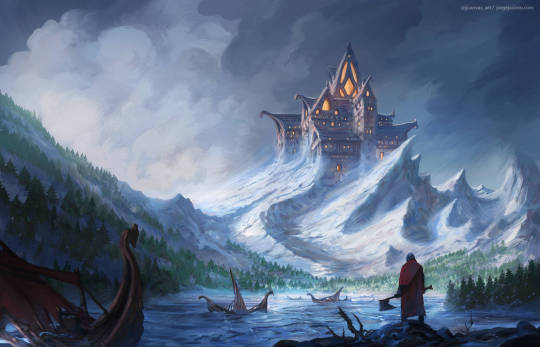
Adventure: The Siege of Frostmanse
A hero takes up arms against a powerful frost giant mage, threatening to destabilize the realm and forcing the party, their allies, and the powers that be to start choosing sides.
For generations Ylnriig the Argent has provided council and arcane insight to kings, jarls, and champions alike, seeking to maintain some measure of calm across the rugged land and icy seas that neighbour her home. Songs are sung about the great wonders she has performed, but also the great prices she has exacted in the name of keeping the peace: Plagues halted by burying villages in ice, destined dooms averted by the noble sacrifice of innocents.
Songs are also sung about Rothger Redsail, and his Redsail raiders. Brave beyond recounting, this living legend and his viking crew are said to have toppled foreign thrones, drunk mead with stormgods, and even sailed over the edge of the world. Now Rothger is back in his homeland and he has no qualms about what his next voyage is to be: He aims to sail against the giant and topple Ylnriig's head from her shoulders, so that the people might never pay her terrible price ever again.
Setup: This scenario works best if the party has a good impression of both Ylnriig and Rothger early on. Trophies from the Redsail's travels hanging in the tavern, local monuments to where Ylnriig averted some disaster through magical might or cleverness. Have the markets flooded with wonders offloaded from Rothger's latest viking expedition, while the town fountain runs with healing waters after being blessed by the giant's own hand. Neither side of this conflict is strictly in the wrong, and both give much to the world simply by their existence.
Everything changes when Rothger sails back into harbour and starts laying the groundwork for his attack on Ylnriig's home, securing supplies and new recruits for the Redsail Raiders, hobnobbing with the local power players to ensure they support his actions. Initially he'll keep the goal of his next expedition secret, boasting to the masses only that his next mission will deliver them into a time of prosperity and opportunity that neither they or their direct forebears could imagine.
Adventure Hooks
Facing some great challenge, the party might be sent to petition Ylnriig for aid, being forced to make the trip to Frostmanse, her isolated sanctum nestled among the far fjords. The ice giant may seem to give them the cold shoulder, sending them off on some wizardly errand as payment for her involvement, but after some time enjoying her hospitality the party may come to know Ylnriig as the deeply caring scholar that hides beneath her shrewd and utilitarian exterior.
Early on, the party might be tempted to join the Redsail Raiders. Doing so would greatly boost their credibility, and give them backing and direction that they'd normally miss out on as independent sellswords. Doing so will likely require that they prove themselves to the hardened sailors of Rothger's warband , but that's what apprentice level adventurers do isn't it?
Eventually a secret long buried will come to light: More than a score of years ago Rothger and Ylnriig used to be lovers, their relationship as passionate and tempestuous as where volcanic flow meets glacial ice. Rothger was off on one of his grand adventures when plague broke out in his home village, a plague that could only be staunched through drastic magical intervention. Ylnriig ran the numbers, and make an awful but nessisary choice that saved tens of thousands while dooming Rothger's family and clan to a cold and awful death.
Though Rothger's animosity towards Ylnriig is genuine, his actions are being backed by a coalition of powerplayers throughout the region who consider the Wizard's continued meddling an impediment to their ambitions. If he succeeds, they'll be able to enact schemes and settle scores that've stayed idle for generations. If he fails, they'll have a martyr to rally support around, as they make a second attempt to oust the giant.
Artsouce
#adventure#faction#sailing#giant#wizard#barbarian#politics#villain politician#villain noble#low level
70 notes
·
View notes
Text
The back end of the karma system is also screwy because it specifically rewards you/makes the game easier if you're good, thereby completely undercutting the harshness of the wasteland and the drive towards self interest we're told reigns supreme in the post bomb era. The play fantasy of being a "good" person is doing the right thing despite how it might disadvantage you, which is totally irrelevant if you have Godd Howard tipping the odds in your favour because you played by the arbitrary rules.
i knowi this point has been driven into the ground by many other people but it is such a funny level of moral dissonance to hack five powder gangers to death with a machete in fnv and get the You Gianed Karma! popup and then steal a slice of ham from their camp and get the :/ You Lost Karma! Stealing Is Wrong! popup
925 notes
·
View notes
Text
Alright, the votes are in, time to share the psychic damage.
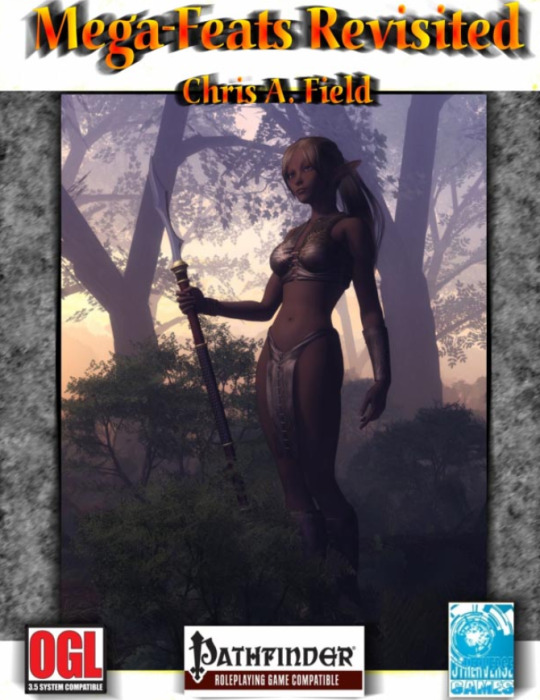
On it's surface Mega-Feats Revisited is like any other 3.5/Pathfinder player supplement, packed to the gills with options for niche builds, some of which are genuinely good and creative (a cleric feat that gives you the ability to give minor healing to the targets of your buff spells), while others are mechanically redundant ( a feat that lets you haggle, a thing you could theoretically already do in game).
Then you get to stuff like this, and you just stop in your tracks:
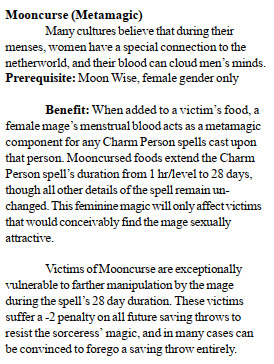
I know that d&d takes inspiration from a lot of different mythologies/folklore traditions, and I know that a lot of those traditions have stuff to do with menstruation. I'm not squeamish, it's a thing 50% of the population needs to deal with... but why have a feat for it? Why of all aspects of moon worshipping pagan-ish practices did this make the cut for a player option? What does it say about your d&d games that you're tracking your character's flows over the course of a campaign and then using that as a month long love potion?
Did I mention there's an entire feat chain for this?
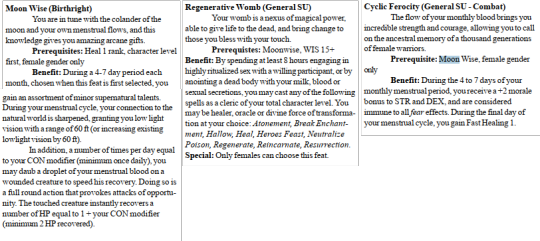
In many ways, megafeats is for me THE 3.5 book, because it combines:
a desire to simulate everything in the most rules lawyer-y way possible
totally unbalanced (both under and overpowered) content that was never playtested, and clearly not designed with fun at the table in mind
an obsession with sex and breeding, jumping right past being unsexy and directly to deeply unsettling.
If you want a better example Look no Further than the Breeder feat:
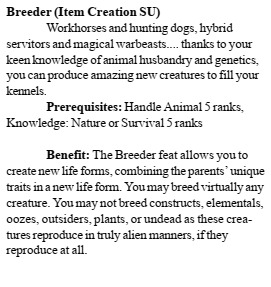
....Which takes up a total of 2.5 pages once you combine it with it's supplimental feats: Breed the Forbidden, Zooamorous Breeder, and Eugenicist (yikes!). Gameplay wise it lets you spend lots of GP and months of dedicated handle animal checks to hybridize different creatures together like you were a professional pokemon player crunching the numbers to try and find a shiny with perfect IVs. Yet again we have to ask what the FUCK kind of game these publishers are playing that they think this is a good player option. Imagine you sat down at a table with a new group to talk over builds and backstories for a new campaign when someone announces their intention to have their ranger spend his time personally inseminating owlbrears in the hopes of breeding a new master race.
I was going to just go on about weird feats (Like the one that lets you retroactively have two heads or one of your parents be a goose, the one that lets you dissolve your skeleton at will, or the actually interesting one that lets you detect if someone's ever killed for money by scent alone) but then I realized that I remembered this particular publisher's name, so I thought I'd do a little bit of a deepdive on him:
Here's a Few Details about Chris A. Field
He's written numerous 3rd party supplements, but most notably:
Multiple furry setting books ( completely normal, d&d wouldn't be what it is without furries) including one set in IRL Oregon that was repopulated by anthro immigrants after the state was depopulated by race riots (wat?)
Black Tokyo, an X rated urban fantasy based off Japanese mythology and late 90s hentai, featuring supplements about busty magic maidens and tournament of rapists. Less said about a game that has legit torture porn as an inspiration the better.
Otherverse america: a d20 modern scifi setting which is set in the aftermath of “the abortion wars” where the pro life/choice debate has formed a fissure in american society that’s spilled over into psionic/cyberpunk lite street violence. I feel like there’s some thematic resonance with the breeder feat here, but I don’t know what it is.
All in all, an odd book by an odd dude, but a neat little window into what the 3rd party publishing space was like back when I was first getting into the game.
You folks want to see the weirdest d&d book in my collection? It absolutely beats out the Book of Erotic Fantasy for sheer whatthefuckery, at least in my opinion.
462 notes
·
View notes
Text
ttrpg player pro tip- just tell your GM when you have a plot in mind for your character. Ask for events to happen. Walk up and say "I want my evil brother to show up and be a huge fight and I try to save him from himself." Your GM will ADORE having a whole encounter outlined for her, you'll get to have an awesome scene play out, you'll be invested, your GM will be invested, it'll be memorable. Hopefully, just don't be foreceful.
The idea that you and your GM will be able to like, psychically intuit each other's ideas for character arcs is bullshit. This is a collaborative relationship; communicate!!
11K notes
·
View notes
Text
You folks want to see the weirdest d&d book in my collection? It absolutely beats out the Book of Erotic Fantasy for sheer whatthefuckery, at least in my opinion.
462 notes
·
View notes
Text
Here's a random 5e mechanics idea, what if you could choose to upcast your single use attack spells (burning hands, lightningbolt) AFTER you roll damage, pouring more juice into the casting if you were dissatisfied with the amount of damage you did.
Obviously it'd be a choice made during the calculation/reroll dice step, but before saves were made. But how to deal with counterspells 🤔
Might work better in a spellpoint system where there's a single pool of caster energy, I could also see it as an additional power to give those spell-artisan feats/class features that let you do things like swap damage types/ AOE shapes around.
28 notes
·
View notes
Text
My party spent a not insignificant amount of time in last night's session debating the merit of various hot dog toppings and whether or not they could exist in a traditional d&d setting. They did this because they encountered one of the settlement's hidden angelic protectors, and after bridging the celestial language barrier determined that this heavenly emissary deserved some street food.
They have named the angel Misty, and have confirmed their new angel friend does indeed enjoy hotdogs.
87 notes
·
View notes
Note
This is a rather specific question, but if we take inspiration from your posts (not one-for-oneing it), and make art related to the lore and post it, would you want credit in that scenario? I took a bit of inspiration from your Bahamut post for the goblin pantheon in my homebrew setting, but the god in question isn't actually Bahamut himself. Just wanted to ask.
Give me a shoutout if you'd be so kind! Nothing big, just maybe an @ in the readmore. This blog is all about sharing inspiration and I always love to see what it's sparked in people.
29 notes
·
View notes
Text
Every (main) character has a fundamental misconception about how the story world works, and good drama is created when this misconception is tested. Does it crack? Crumble? Evolve? Become replaced by something else? Something worse?
Characters often acquired this misconception when they were confronted with the themes of their story and learned the wrong lesson at the cost of it.
That way there's narrative closure when they're confronted by the themes again and they learn the RIGHT lesson.
I need everyone’s best character advice. STAT.
42K notes
·
View notes
Text
remember, folks, if you're itching to do something ill-advised in d&d/similar TTRPGs,
low wisdom: poor impulse control
low intelligence: instructions unclear
high wisdom: a necessary risk
high intelligence: it looked better on paper
low wisdom, high intelligence: forgot to get the plan peer-reviewed
high wisdom, low intelligence: the risk i took was calculated, but man am i bad at math
high wisdom, high intelligence: if someone else in the party did it first, it would've gone so much worse (and you Know they were going to do it)
9K notes
·
View notes
Text
He's also improved how he's run mysteries over time: Bad rolls at Brennan's table don't give you NO clues, they give you skewed /incomplete clues, clues that might be relevant to something else, or clues buried in a jumble of other information that you have to pick through. You can likewise see him asking for rolls less for things players could obviously see/intuit.
Brennan is a master storyteller, and like any master of a craft he is SO excited to show off all the labor and love he's put into the things he's made. Sharing it is an act of love and that's what the "we have to subvert audience expectations" crowd will never get. Plus, Brennan's background is in comedy, can you imagine some kind of comedian who's point of pride was that the audience didn't get their jokes?
I love when people get the mystery Brennan's laid in front of them and Brennan just so proud says "no rolls necessary"
12K notes
·
View notes
Text
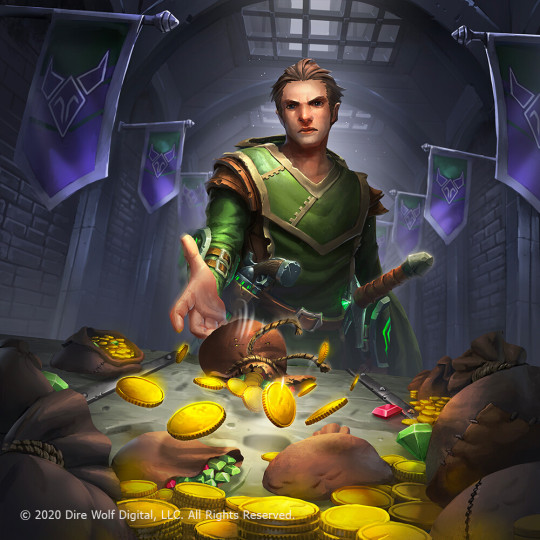
DM Tip: The Debt Always Comes Due
Isn't it weird how little we engage with gold as a real gameplay system? Sure, at low level wealth makes a great questhook, the party is usually hurting for a payout so that they can afford necessary gear upgrades/ubiquitous healing potion restocks/their next trip to the magic item shop. After a while though the promise of raw wealth loses its lustre, and the party is less likely to go out of their way to accept bounties, go off chasing treasuremaps, or accept gigs from shady patrons.
Generally I'd advise that this is a sign that your party are done being run of the mill sellswords, and it's time to hit them with a big epic questline that's focused more on emotional and narrative stakes than base currency. That said, sometimes you want to run a longer adventure arc that's centred around the acquisition of wealth, but to do that, you're going to need to go against the grain on one of the foundational assumptions that underpins D&D both mechanically and narratively.
TLDR: If you want your party to be motivated by gold past their first big pay off you should consider using a "wealth hurdle", which in short is a narrative and gameplay challenge that forces them to collect not only more gold than they already have but also more gold than they could get doing what they've been doing so far. This can be anything from a crimelord calling in a debt on them or one of their allies, a powerful monster swooping in and demanding tribute, comissioning some grand construction, or funding the defence of a region. Having the hurdle active should cause problems for the party, and not clearing the hurdle before a perdetermiend deadline will immensely bad things to happen. This will force the party to take risks they otherwise wouldn't, giving a high degree of focus to their subsequent adventures that they wouldn't have if they were content.
What we're trying to fix:
At it's core, D&D is a power fantasy, and a good chunk of its gameplay mechanics regardless of edition are about acquiring new strengths, options, and assets. These assumptions are likewise built into the genre and narrative structure of most campaigns: Heroes undertake quests usually for the promise of some reward, gain experiance/hit milestones along the way, and eventually stumble across some kind of loot drop at the end. There's nothing strictly wrong with this, but it does mean that all the resource problems the heroes face in the early game (and the inbuilt motivations that come along with them) are all but resolved by the time they hit the next gameplay tier.
This is complicated by the fact that outside of 3rd party options there's not much to spend money on. The DMG (which you should totally ignore) say you shouldn't let them buy magic items, and the common wisdom would say "let them buy a keep", but that solution only appeals a niche selection of adventuring parties.
Using Weath Hurdles turns acquiring gold not just into a quest goal but a gameplay challenge, forcing your party to scour the land for potential sources of wealth (and risk upsetting whoever or whatever happens to be currently holding it) and take on challenges they'd never normally attempt if there was only survival/personal enrichment at stake.
Food for Thought:
Tradional d&d structure has the party getting a huge payout at the end of their adventure in the form of a bosshoard or questgiver reward which is a very backloaded "you can have your dessert after you finish your greens" sort of attitude. Consider switching it up sometimes: have the party's patron or employer give them a small stipend to spend on kitting themselves out, have an early game treasure haul so the party can have a mid-arc shopping episode. This is especially useful in higher level games where your party may go weeks to months without a level up as it preserves the feeling of progression and gives them new toys to play with in between the big character defining abilities.
Recently I've been learning my way around blades in the dark (can't reccomend it enough btw), and just like any other time I've wanted to learn a new ttrpg system I'm having to do a bit of neural rewiring when it comes to figuring out how to write and run sessions of the game. Coin in BitD is both an XP (used for upgrading the party's shared crew sheet) a resource (burned to upgrade the results of various rolls) and a stat ( rolled to see if the players can lay their hands on various hard to come by items). It didn't really click for me until my first group messed up really badly on what was supposed to be their introductory adventure and pissed off the local crimeboss. I was just going to have him bully them, lock them up and then have a jailbreak the next session ( it's what I'd do in d&d), but on the fly I had the idea that he'd let them go with a massive debt they needed to pay off, which forced them to either pay him a percentage of their takings on all future jobs, or do small jobs in utmost secrecy so that they could build up their own strength under his nose.
Interestingly enough, the d&d game where I thought player wealth as a resource was most interestingly used was Dimension 20’s starstruck Odessy, which was a conversion of the amazing fanmade starwars5e system. Starstruck is a parody of hypercapitalism and aptly uses money as both a narrative and gameplay feature. One character is stuck paying weekly insurance premiums on a debt he would never be able to pay down forcing him to act recklessly to acquire wealth in the immediate future. Another character was a economic and political power player and some of the best moments in the series come from her high stakes wheeling and dealing and bouncing money between accounts while the rest of the group engages in epic space battles; the rest of the crew might’ve barely got their ship out of the dogfight, but she’s the one who ensures they can pay for the repairs once they get to the space dock. None of this would be possible without completely ignoring the normal constraints of wealth per level: gaining and losing huge sums based on moment by moment player decisions, The need for them to play along with the absurist gig economy to boost their rating and get better paying jobs, making a devil’s bargain with a corporate sponsor all so that they could risk their lives in a deadly arena fight all for the (very unlikely) chance of winning the equivalent of a million GP. Not every campaign should, or even could so focus on money in this way, but it was FASCINATING to watch it in action.
Artsource
154 notes
·
View notes
Text
In addition: Want to make your players really feel like heroes?
Let them interrupt someone else's horror movie. Create an npc with some baggage, put them in a scenario specifically designed to be their own personal nightmare, and let the party kick in the door and save them from what ten seconds before felt like an inevitable tragedy.
Disasters, hauntings, fairy curses, petty acts of cruelty, nothing will make your players bond to an npc like getting to be the unequivocal good guys.
Plus, it's easier to scare an npc in game than it is to actively terrify a battlewise party.
I’ve said this before but I think all sci-fi and fantasy adventure needs a little bit of horror as seasoning. It doesn’t need to be full sci-fi horror or fantasy horror but a little bit of scary adds flavor. Build a world and then explore the fucked up implications of that world a little bit
46K notes
·
View notes
Text
Another Tales of the Valiant note: backgrounds just straight out give you a feat (called a talent). I think this is a notable improvement over the default "backgorund feature" which was always more of a stopgap to get newer players to roleplay.
Feats at 1st level have been a thing forever, but plugging them into backgrounds is a delicious way of making that powerboost specifically tie into the character.
They've also replaced the class specific bonds/ideals/flaws with Adventuring Motivation which serves much the same purpose if being more specific to creating a character who's going on an adventure.
34 notes
·
View notes
Text
Got my hands on tales of the Valiant today (Kobold Press's d&d successor) and while most of it is largely just a better version of 5e (better layouts, some class restructuring, spells codified into 4 lists ala pathfinder) the most interesting mechanical change is their modification to Inspiration
To put it briefly, inspiration has been replaced with luck, which is a stacking resource you get whenever you fail a roll in addition to all the ways you'd normally gain inspiration. You can spend luck to boost rolls on a 1:1 basis, or spend 3 to reroll any d20 you'd roll (so it can't quite cancel out disadvantage). To encourage you to spend Luck any time you have more than 5 , you have to roll a d4 and can only keep that many.
I think it's a very interesting tool to put in player's hands, as for a while I've been considering how to keep forward momentum when the players suffer a run of bad rolls.
I might merge it with some of my other inspiration hacks, such as acting upon your backstory/character concept (inspired by bg3) or engaging with the piety system.
123 notes
·
View notes